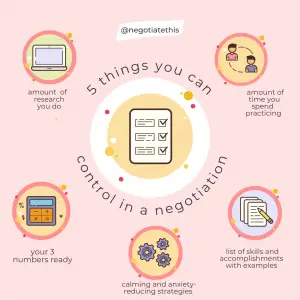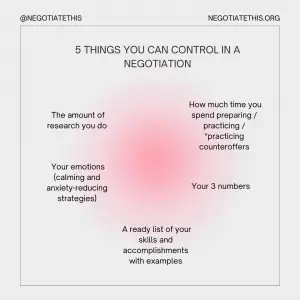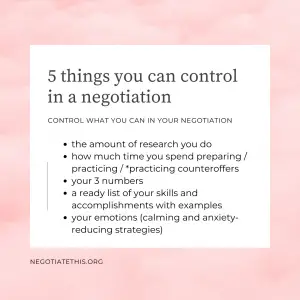Focus on what you can control in a negotiation. Just like in any nerve-wracking situation, in a negotiation there are certain factors you can and cannot control. Focus on the things you can control. Simple, right? With these 5 tips, it will be! There are specific items in a negotiation that you can prepare so you are ready and in control of as much as possible. Focus on what you can control in a negotiation before, during and after the negotiation.
Focus On What You Can Control In a Negotiation
Here are some things you can control in a negotiation:
- The amount of research you do
- How much time you spend preparing / practicing / *practice counteroffers
- Your 3 numbers
- A ready list of your skills and accomplishments with examples
- Your emotions (calming and anxiety-reducing strategies)
Focus on what you can control in a negotiation.

What You Can Control In a Negotiation
Focus on What You Can Control in a Negotiation Tip #1: The amount of research you do
You can choose to walk into your negotiation prepared or unprepared or somewhere in the middle. I’m guessing you want to walk in prepared though, right? That’s something you can control, so definitely do that.
What negotiation research should you do? You want to identify exactly what it is that you are going to be asking in your negotiation. Have you identified that? If it’s a dollar amount, you can do research on salary websites. Type “top salary websites” into your search bar and follow those leads. Make sure to guage this research for things like experience, location and company size.
That is only the beginning. If you are looking to see if what you’re asking is appropriate (Example: Is your ask way too low? Too high? Just right? How do you know?), make sure to check in with coworkers. Let them know what you’ll be asking for and what they think of it. If they laugh, ask what they would change. If they approve, maybe go a little higher. You decide.
For tips on how to ask coworkers these questions, check out the article: How Much Money Do You Make? 5 Easy Ways to Ask Coworkers
If you don’t work there yet, cold message people on LinkedIn. Sounds risky, right? But what’s there to lose except more preparedness and research? Lots of people have been in your position and you may be surprised at who is willing to help. Be kind and give it a try.
Online research is very different from asking real people for information. Keep that in mind and try to gather as much information from real sources (not just internet websites) as possible.
Focus on What You Can Control in a Negotiation Tip #2: How much time you spend preparing and practicing
Now that you know what you’re going to ask for because you’ve done some serious research, have you practiced? Not just in your head, but out loud. I’m serious. It makes a difference to hear the words come out of your mouth. Practice in the mirror and out loud. The next step up is to practice on your cat. After that a real human being. And then get feedback. Role-play with them if they’re willing. Another good idea is to record yourself then watch the replay. Where do you sound confident? Where could you improve your argument?
Bonus Tip: Practice counteroffers
What if they say no? How could they say no? Well, in some ways it could be a part of their job. So prepare for it. People (bosses) are initially reluctant to give out more money in the workplace. Practice the other party saying no. How will you respond? You don’t want to just say “okay” and leave. You’re there to get what you want!
Check out the article: 5 Easy Steps To Take If There “Aren’t Any Funds Left

Focus on What You Can Control in a Negotiation Tip #3: Your 3 numbers
What are the 3 numbers, you ask? Great question.
The 3 numbers are:
1. Asking price
2. Desired price
3. Walk away price
Check out the post 3 Numbers You Need to Have Ready When Negotiating for more info.
1. Asking price
The asking price is higher than the price you actually want. Aim high. If it’s not in monetary form, it’s more in another way. Are you asking for 2 weeks more of vacation? Why not make it 3?
2. Desired price
This is the price you want. You asked for a higher amount than you wanted, so if they negotiate your price down, you will still feel okay because you were expecting this and prepared for this process.
Non-monetary example: Since you asked for 3 weeks more of vacation and they negotiated you down and you both agreed on 2 weeks, then that’s ideal because you originally wanted 2 weeks.
3. Walk away price
If this price (or other standard) is not met, you walk away. In a salary negotiation, this is your lowest accepted price. This is the price you will go down to if you really have to, depending on the situation. If this price is not met, you walk.
Maybe in your situation it’s not to “walk”. Maybe it’s to work on another item to negotiate. It could be to finish a project with excellence and revisit the topic. You decide what the next step is for your situation.
Having your 3 numbers ready is an important item you can control in a negotiation.
Focus on What You Can Control in a Negotiation Tip #4: A ready list of your skills and accomplishments with examples
Make sure you have examples to back up your ask. You don’t just want to walk into the office (or Zoom meeting) and say, “Hey, I want this much.” Ideally you want to show the value you’ve provided through multiple examples. You want to lead with that. Lead with all the great things you’ve done for them and all the value you add in so many different ways.
Having a list will help you feel ready and confident and is a key item to help focus on what you can control in a negotiation.
Check out the post 3 Easy Steps to Promote Yourself in a Negotiation for more tips.
Focus on What You Can Control in a Negotiation Tip #5: Your emotions (calming and anxiety-reducing strategies)
This situation is nerve-wracking by nature for most people. So… prepare for that!
Keep your emotions in check by equipping yourself with calming and anxiety-reducing strategies. This means different things for different people. Read your favorite quote, do a meditation, listen to your favorite song, do a power pose, whatever you need to do to get in the right mindset and calm yourself, do it!
Also practice being calm in a stressful situation. Deep breathing is a good tip. Have water nearby. Be prepared for them to say NO (and how you’ll respond). That in itself can be a calming strategy. Knowing that silence is okay in a negotiation is also a good reminder. If you’re in a virtual conversation, maybe you are holding on to a stress ball.
You have practiced out loud, so that can reduce some of the nerves, too (don’t skip that step!). This is an important way you can focus on what you can control in a negotiation.

Put It All Together & Focus on What You Can Control in a Negotiation
You’ve got this. There is a lot you can’t control in a negotiation (like your boss, the budget, a response, precedence, mood, etc.). But there’s a lot that you can control. Focus on what you can control in a negotiation. It’s a choice.
You got this.
Negotiate for your worth by taking the time to focus on what you can control in a negotiation.
Want More on Negotiation?
If you want weekly motivation and negotiation tips, sign up for blog posts and for daily inspiration follow @negotiatethis on Instagram. You got this. All you need is a little negotiation inspiration!
Want more negotiation tips? Check out these posts to help you in your next negotiation:
- 4 Reasons You Need to Track Your Work Wins and How They Help You Do Better in a Negotiation
- What Are Your Salary Expectations? How to Best Answer
- 7 Steps to Take When You Find Out You’re Underpaid
- What Are the Best and Worst Methods for Negotiating?
- Top 5 Negotiation Tips for a Smoother Negotiation
- 3 Powerful Negotiation Tips No One Tells You
- 3 Easy Steps to Promote Yourself in a Negotiation
- 4 Important Questions You Need Answered Before Your Negotiation
- 3 Tips: Find the Numbers to Emphasize Your Valuable Contributions
- 6 Important Items to Think About When Asking for More
- When You Negotiate Make Sure You Complete These 8 Items
Disclaimer: While the contents of this post and blog come from research and personal experience, each experience, situation and/or person has their own unique circumstances. This is not negotiation, financial or any other form of legitimate or official advice from an expert. Each individual should do their own independent, comprehensive research. Negotiation, career and all other decisions are the sole responsibility of each individual or party. Details found on the blog and in individual posts are opinions and should be treated as such for entertainment purposes only. Read further disclaimer information in the footer and on the Disclaimer page.
